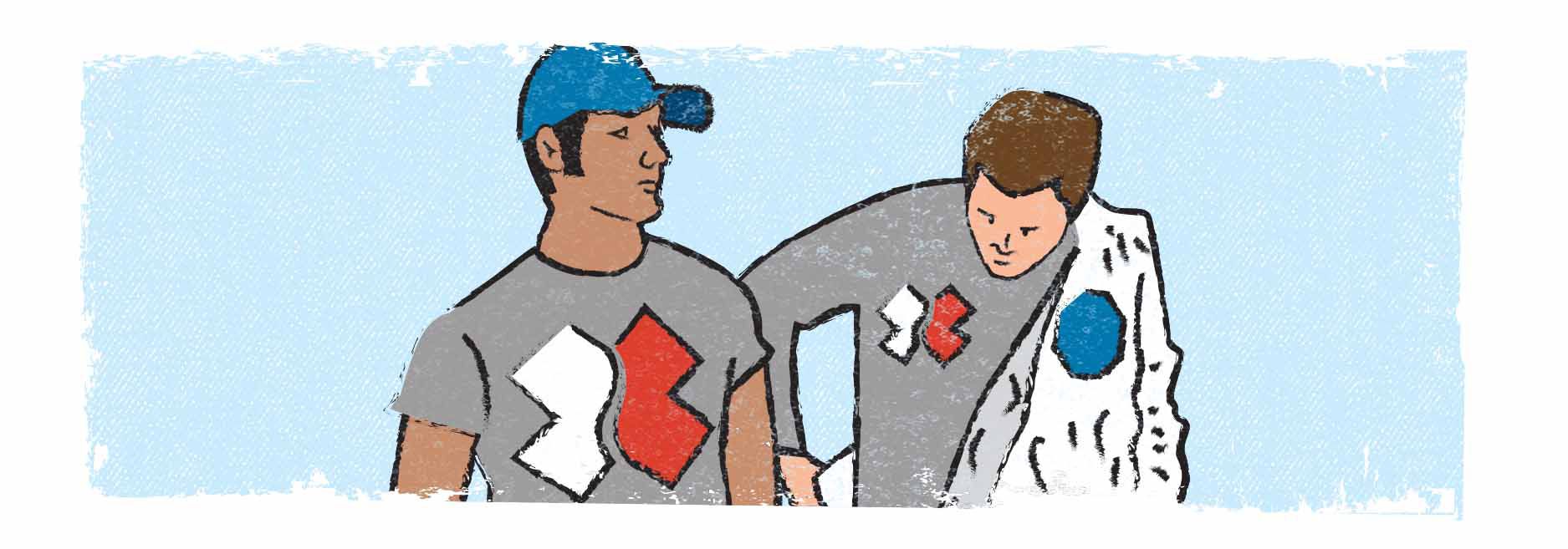Bias for action: Team Rubicon
By Barry Bachenheimer
EdD, NREMT/FF

This is an abridged version of the original article, published in EMS World, with permission of the author.
An EF-3 tornado blows through the street of a Midwest town. A hurricane may have decimated parts of the Florida panhandle. Or maybe an unpredicted winter storm has damaged homes in an upstate suburb.
In all these cases, you will have local fire departments, EMS, police, OEM and governmental agencies on the scene quickly and for the days and weeks after to help in rescues and emergency response.
But what about after the initial emergency is over? You might get a team from FEMA as well as the Red Cross. If your area has a need, you might also get a response from Team Rubicon.
What is Team Rubicon?
Team Rubicon is a veteran-led humanitarian organization that serves global communities before, during and after disasters and crises. Their mission is “providing relief to those affected by disaster or crises, no matter when or where they strike. By pairing the skills and experiences of military veterans with first responders, medical professionals and technology solutions, Team Rubicon aims to provide the greatest service and impact possible.”
Born in 2010 after a large earthquake in Haiti, Team Rubicon was founded by a small group of United States Marine veterans whose goal was to repurpose veterans’ skills for disaster relief. Starting with a small group in 2011 in a response to a tornado in Alabama, Team Rubicon has since grown to encompass more than 150,000 personnel and has responded to over 1,100 incidents over the past thirteen years.
Team Rubicon engages in a variety of activities. In the beginning, they focused on disaster response and humanitarian aid. Today they are a multi-mission agency providing a variety of services including removing mud and muck from flooded houses, emergency medicine, incident command, cutting downed trees off of roofs, repairing damaged homes and clearing debris off roadways.
Over the past two years, the group’s mission has expanded to include vaccine distribution, assisting with COVID testing, and the formation of the Veterans Coalition for Vaccination, which focuses on building national vaccination trust in addition to other core tenets such as fighting the spread of vaccine misinformation and equitable distribution of vaccinations to underserved communities.
Why veterans?
For some members in the service, the transition from military to civilian life is not the easiest. According to Team Rubicon’s website, “Continued service through disaster response provides the elements of purpose, community and identity that are often difficult to find after taking off the uniform. These intangibles are extremely helpful in creating a successful transition from military to civilian life.” Veteran volunteers work alongside first responders and civilians to form a strong force multiplier to assist local agencies. Volunteers for Team Rubicon are affectionately known as “greyshirts.”
“All about the connections”
William Porter is director of the Operation Support Branch for Team Rubicon. The former Air Force veteran and law enforcement officer discovered that he could use many of his skills acquired in the military for disaster response.
Porter started volunteering with Team Rubicon in 2012 and has worked his way up to his current role. “It is all about the connections,” shared Porter. “The success of the group is about connections with groups like FEMA; maintaining good domestic and international relations; and working with our government, corporate and NGO partners.”
Partnering with DuPont
Recently, Team Rubicon and DuPont announced an expanded partnership. DuPont has been assisting Team Rubicon with donations of Tyvek® suits for the last several years. Tyvek® suits are worn for a variety of missions, from cleaning muck out of flooded homes to assisting at COVID vaccination sites.
“As a premier manufacturer of protective gear, their name is well-known and they are the science and safety experts,” shared Porter. In addition to providing personal protective gear that keeps Team Rubicon volunteers and personnel safe, DuPont is now providing even more resources, including subject matter experts in disaster response, training resources and ad hoc safety officers for incidents. “The sky is the limit when it comes to this partnership,” said Porter. “They even help with town hall meetings in affected towns to help folks get back to their homes after a disaster.”
EMS connections
According to Porter, like EMS, “Team Rubicon is always preparing for the next response.” Team Rubicon was the first North American NGO to be internationally verified by the World Health Organization as an Emergency Medical Team Type 1 (mobile) unit.
Team Rubicon is always recruiting new volunteers, both veterans and non-veterans alike. “EMS folks would make amazing volunteers for Team Rubicon,” shared Porter. “If you have a bias for action and you want to put your footprints on the world while you help others, Team Rubicon has a spot for you. In EMS, sometimes you get a thank-you and sometimes you don’t. Either way, you often don’t find out what happens after you deliver your patient to the hospital. In disaster relief with Team Rubicon, not only do you get the satisfaction of helping people, you are helping folks navigate their recovery for the long term after a major incident. The look of gratitude and relief people give you makes it all worth it.”
For more information about Team Rubicon, including information on how to volunteer, check out teamrubiconusa.org/volunteer/.
Read the full article on EMS World here.
